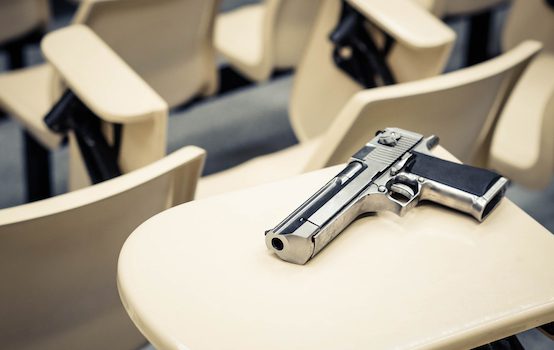Gun Control Lobby Eviscerates College Carry Law

Beginning July 1, holders of a Georgia weapons license could finally carry their firearms onto their college campus without being in violation of state law. Unfortunately, House Bill 280, which amended Georgia law to allow campus carry, is far from perfect.
Pressure from gun control advocates resulted in the inclusion of a provision eviscerating most of the bill’s practical utility, forcing most university-goers to leave their weapons locked away, failing to make the campus a safer place.
Georgia’s amendment comes in the wake of a broader movement to enable responsible Americans to carry their firearms without having to disarm in their normal daily lives. Ten states require that firearms generally be allowed on publicly funded campuses, eight by law, and two by judicial decision. These early adopters of campus carry will serve as examples for states down the line. Georgia’s law, though, serves as a cautionary tale about the result of giving too much deference to gun control advocates.
Most campus carry bills have carve-outs, which leave some areas of campus off limits to those concealing weapons. Georgia’s amended law is no different. GWL holders may not bring their weapons to school sporting events, student housing, areas used for disciplinary procedures, or certain vocational courses. The problem, though, is that Georgia’s law forbids carry in any class where high school students are dual-enrolled.
Opponents of campus carry in Georgia, as well as other states with similar initiatives, argued that allowing licensees to carry would pose a threat to high school dual enrollment programs and their students. The brunt of the argument was that gifted high school students and their parents would be terrified by the idea that an adult who had been judicially vetted might have a concealed weapon. The fear was that this would scare high school kids away from programs like Georgia’s popular Move On When Ready (MOWR), through which they can earn university credit early by taking college classes while still in high school.
Unlike other states, which justifiably ignored the assertion that dual enrolled students needed special treatment, the Georgia legislature felt the need to respond to these concerns. The law contains an exception applying to “any room or space” being used for a class in which a high school student is enrolled. The effect of this is that GWL holders on campus are imperiled to ensure there are no dual-enrolled high school students in any of their classes. There is no clear procedure for informing students, placing the onus on GWL holders to stay on top of who is in their classes, lest they face criminal charges.
The problem here is that Georgia’s campus carry provision conditions a Georgian’s ability to defend themselves on the actions of other people. If a student or professor is lucky enough to have no high schoolers enrolled in their classes, they might go about their day without incident. However, if even one high schooler enrolls in a class, the force of law compels all GWL holders to go to their car, lock their weapon therein, and proceed to their class both defenseless and highly inconvenienced. This is doubly problematic for those without automobiles or who rely on public transportation to get to school, as the law leaves no safe haven place for these people’s weapons. Therefore, if a high school student happens to sign up for one of your five classes, and you lack a vehicle to store your weapon during that class, it is as if you had no right to carry on campus at all.
High school students are not an uncommon sight at Georgia colleges and universities, either. The MOWR program is incredibly popular, with nearly 30,000 students enrolled in 2016. With the program’s popularity, it could be difficult for students and faculty to have a schedule that allowed them to carry on campus at all.
The concerns leading to the high school student carve-out are baseless and should have been ignored. A campus with licensed concealed carriers would be no different from shopping malls, public places, retail stores, or any of the other terrifying places school-aged people find themselves every day. Georgians have enjoyed the right to carry concealed almost anywhere for longer than any current high school student has been alive, and thus there is no particular danger associated with a classroom––much less a classroom that happens to have a dual enrolled student in it––that justifies abridging the right of responsible Georgians to have the best possible means of protecting themselves.
There is nothing about dual enrolled students that make them prime targets, either. Most of these sixteen-to-eighteen year olds will blend in perfectly to their classes, and thus there is no reasonable safety concern that justifies this policy either. The exception only serves to single out these students, and make them the subject of frustration for inconvenienced GWL holders. The negative attention and inconvenience attending this provision might actually do more to discourage high schoolers from dual enrolling than lawful campus carry ever did.
Georgia’s campus carry law is a step in the right direction, but the carve-out for classes with a dual enrolled student is a step too far. The exception makes a Georgian student or faculty member’s right to carry an effective means of self-defense a complicated regulatory mire, turning classrooms that happen to have a particular type of student into a legal booby trap. This exception should be removed so Georgians can be safer––both from unlawful force and unreasonable laws.
Matthew Larosiere holds a J.D. and LL.M in taxation from the University of Alabama School of Law and is a Young Voices Advocate.
Comments